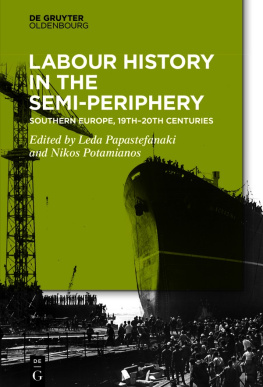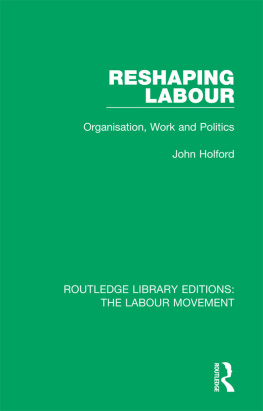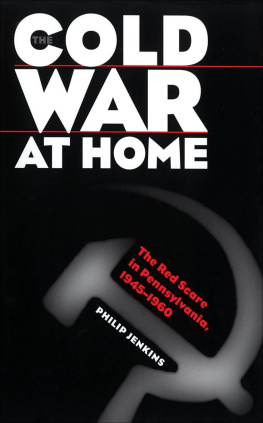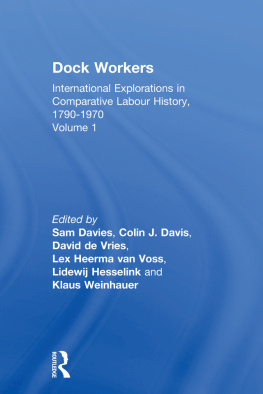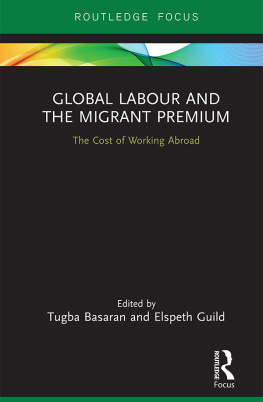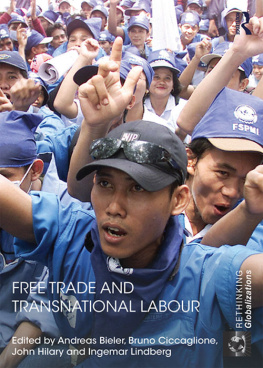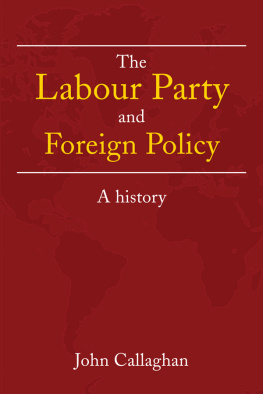Copyright 2018 Anthony Carew
Published by AU Press, Athabasca University
1200, 10011 109 Street, Edmonton, AB T 5 J 3 S 8
ISBN 978-1-77199-211-4 (cloth) 978-1-77199-212-1 ( PDF ) 978-1-77199-213-8 (epub)
doi: 10.15215/aupress/9781771992114.01
Cover design by Marvin Harder
Interior design by Sergiy Kozakov
Printed and bound in Canada by Friesens
Cover image: Irving Brown (second from the left), with Greek trade union leader Fotis Makris (left), during a visit to Athens in January 1950 [detail]. Courtesy of the Special Collections Department, University of Maryland.
Library and Archives Canada Cataloguing in Publication
Carew, Anthony, 1943, author
American labours Cold War abroad : from deep freeze to dtente, 19451970 / Anthony Carew.
Includes bibliographical references and index.
Issued in print and electronic formats.
1. AFL-CIOHistory20th century. 2. Labor unionsPolitical activityUnited StatesHistory20th century. 3. Labor unionsEuropeHistory20th century. 4. Labor movementUnited StatesHistory20th century. 5. Anti-communist movementsUnited StatesHistory20th century. 6. Anti-communist movementsEuropeHistory20th century. 7. International labor activitiesHistory20th century. 8. Cold War. 9. United StatesForeign relations19451989. I. Title.
HD8072.5.C37 2018 | 331.88097309045 | C2018-902151-9 |
C2018-902152-7 |
We acknowledge the financial assistance provided by the Government of Alberta through the Alberta Media Fund.
Please contact AU Press, Athabasca University at for permissions and copyright information.
Acknowledgements
As this book has been so long in preparation I have accumulated debts to a large number of people. Sadly, several of them are no longer alive, while others may have long forgotten that they ever rendered assistance. Nevertheless, I want to thank Walter Kendall and Richard Fletcher, who first steered me in the direction of this research, and Joan Keating and Amanda Lucas, who helped with early fieldwork at the Modern Records Centre and TUC Library. My good friends Ian Bullock and Victor Rabinovitch have observed my progress, or lack of same, from start to finish, reliably on hand to offer encouragement, read drafts, and suggest valuable textual changes. Their help has been invaluable.
There was more than an element of madness in my attempting to research in depth an aspect of the American labour movement from a base in Britain and on a shoestring budget. I am therefore deeply indebted to friends Bill Schaap, Ellen Ray, Louis Wolf, Dolores Neuman, Ann Harvey, Kevin West, Cleo Moran, and Ike and Fay Krasner, who at various times took me in, provided shelter, and otherwise pointed me in the right direction.
I have greatly appreciated the willingness of the following trade unionists to assist, in some cases by recalling their participation in events described in the book, in others offering their perceptions as close observers: Mark Anderson, Fabrizia Baduel Glorioso, Jim Baker, Dan Benedict, David Brombart, Harm Buiter, Byron Charlton, Mike Cooley, Nelson Cruikshank, Andr Dewil, Tom Donahue, Ken Eaton, Sven Fockstedt, Charles Ford, Douglas Fraser, Dan Gallin, Collin Gonze, John Harker, Veronika Isenberg, Newman Jeffrey, Jack Jones, Kalmen Kaplansky, Joe Keenan, Eugenia Kemble, Bill Kemsley, Lane Kirkland, Denis MacShane, Heribert Maier, Joe Morris, Len Murray, Marjorie Nicholson, Joanna Pilarska, Jack Otero, Victor Reuther, Rosy Ruane, Kaare Sandegren, Penny Schantz, Manuel Simon, Paul Symogyi, Virginia Tehas, Victor Thorpe, John Vanderveken, Michael Walsh, Leonard Woodcock, and Jerry Zellhoefer. I am especially grateful to Stefan Nedzynski, former general secretary of the Postal, Telegraph and Telephone International, who, before his death, invested considerable time in helping with an understanding of the politics of the ICFTU secretariat and developments in African trade unionism in the 1960s.
Several former labour attachs and labour counsellors have been generous in sharing insights gained from their unique vantage point, including Sir Peter Carr, George Foggon, John Mainwaring, Michael McDermott, Douglas Talintyre, Kari Tapiola, Birger Viklund, and Murray Weisz.
I am grateful to library and archival staff at institutions on both sides of the Atlantic, notably at the George Meany Memorial AFL-CIO Archives, University of Maryland; Walter P. Reuther Library, Wayne State University, Detroit; Kheel Centre for Labor-Management Documentation and Archives, Cornell University, Ithaca; Hoover Institution, Stanford; International Institute for Social History, Amsterdam; Tamiment Institute, New York University, New York; TUC Library, London Metropolitan University; National Archives, Kew; Library and Archives Canada, Ottawa; Friedrich-Ebert-Stiftung, Bonn; State Historical Society of Wisconsin, Madison; Arbetarrrelesens arkiv och bibliotek, Stockholm; UAW Library, Detroit; Special Collections Library, Penn State University, State College; Modern Records Centre, University of Warwick, Coventry; Labour Party Archives, Peoples History Museum, Manchester; and my friends at the Working Class Movement Library, Salford. I particularly want to thank Stephen Bird, Ben Blake, Steven Calco, Elizabeth Clemens, Christine Coates, Carolyn Davis, Jennifer Eidson, Lars Gogman, Pete Hoefer, Jeff Howarth, Mieke Ijzermans, Arieh Lebowitz, Gail Malmgreen, Jane Murphey, Silke Neusinger, Warner Pflug, Lee Sayrs, Kathy Schmeling, Patrizia Sione, Mike Smith, Sarah Springer, Laurie Townsend, Erhan Tuscan, Monique van der Pal, Mary Wallace, and Hubert Woltering. At Athabasca University Press, Karyn Wisselink proved invaluable in helping me transition to the digital age.
I have benefited immeasurably from the work of other scholars mining at the same or adjacent coalfaces, including Richard Aldrich, Julia Angster, Myriam Bergamaschi, John Boughton, Kevin Boyle, Alessandro Brogi, Alan Campbell, Eric Chenoweth, Barrett Dower, Michel Dreyfus, Ronald Filippelli, Alvin Finkel, Eleonora Guasconi, Rebecca Gumbrell-McCormick, Quenby Olmsted Hughes, Richard Hyman, Hans Krabbendam, Annie Lacroix-Riz, Ulla Langkau-Alex, George Martens, John McIlroy, Klaus Misgeld, Koji Nakakita, Leopoldo Nuti, Karen Paget, Bob Reinalda, Yevette Richards, Magaly Rodrguez Garca, Federico Romero, Giles Scott-Smith, John Stoner, Frances Stonor Saunders, Reiner Tosstorf, Douglas Valentine, Mathilde von Blow, Marcel van der Linden, Geert Van Goethem, Rob Anthony Waters, Edmund Wehrle, Peter Weiler, Hugh Wilford, Chris Wrigley, and Bob Zieger. I am especially grateful to Nelson Lichtenstein and an anonymous reader who provided supportive feedback and made helpful suggestions for improving the final draft.
For research grants that made this project possible, I am most grateful to the British Academy, the Nuffield Foundation, the Lipman Miliband Trust, and the Henry Kaiser Foundation. I also benefited greatly from the award of a Rockefeller Fellowship at the Archives of Labor and Urban Affairs, Detroit, and a Visiting Fellowship at the International Institute of Social History, Amsterdam.


